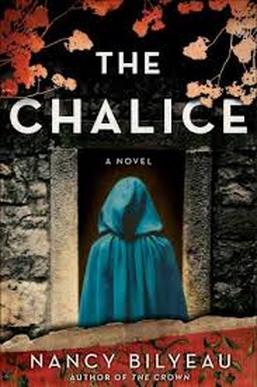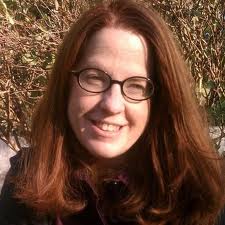 Lovely cover, don't you think? I'm delighted to be joined today by the talented Nancy Bilyeau, author of The Crown and The Chalice, historical thrillers set in Reformation England. From the official blurb: In 1538, England is in the midst of bloody power struggles between crown and cross that threaten to tear the country apart. Aristocrat-turned-novice Joanna Stafford has seen what lies inside the king's torture rooms and risks imprisonment again, when she is caught up in a shadowy international plot targeting the King. As the power plays turn vicious, Joanna understands she may have to assume her role in a prophecy foretold by three different seers, each more omniscient than the last. Joanna realizes the life of Henry VIII as well as the future of Christendom are in her hands—hands that must someday hold the chalice that lays at the center of these deadly prophecies… ********************************************************************************** "In the midst of England’s Reformation, a young novice will risk everything to defy the most powerful men of her era." ********************************************************************************** The other day, I came across a comment you'd made about The Chalice. “I wrote a novel set five centuries ago, in a country I don’t live in, about a religion I don’t practice.” So, tell us, what in the world inspired The Chalice? NB: Both The Crown and The Chalice come from my lifelong passion for English history, which defies all explanation. I know that the conventional wisdom in fiction is “Write what you know,” but I always love entering new worlds in my reading, far from my daily experience. There have been plenty of novels written about modern life in New York City and I am sure they’re quite good but I haven’t read them. I’d rather watch “Game of Thrones” than “Sex in the City.” The Chalice, set at a key moment in the English Reformation--in 1538--is a carefully researched novel. What was your favorite part of doing the research? Least favorite? NB: I have a sizable home library of nonfiction books on England, acquired at a steady clip since I was a teenager. I drew on that base of knowledge when coming up with the broad outline of the plot for The Crown and The Chalice. Then I would do deep dives into certain areas that I needed detail on: life in a priory of Dominican nuns; the mystery behind the missing body of Saint Thomas Becket at Canterbury; the menu of a dinner in an aristocratic household; travel by boat from England to Flanders. All sorts of things! I love finding the little details that I can use to make a scene come alive, such as what would be served as breakfast to Dominican friars in the 1530s. My least favorite is when I can’t find what I need and it’s delaying the writing. But I am stubborn; I keep going until I learn enough to help my story. Joanna Stafford—a former novice—is an unconventional heroine for any time period. Tell us about your thought process as you developed her character. NB: I wanted her to be genuinely pious but to be a real person too, with frailties and flaws, such as a quick temper. Strong but sometimes reckless. Intelligent but naïve. It was important to me that I create a dimensional person.  The talented Nancy Bilyeau The Chalice is your second novel. In what ways were your writing and publishing experiences different or similar from your experience with The Crown? What was the most surprising aspect of this experience? NB: The experiences were very different. I wrote the first book in fits and starts, in various workshops, over five years while balancing my day jobs in magazine publishing and raising two children. I wrote the second book during a year-long break from editing in one place and without stopping: a writer’s room in the New York Public Library. It was much easier to create that way, with momentum and focus. Also I had more confidence, because although the first book hadn’t come out yet, Simon & Schuster had bought it. When writing The Crown, I was flying blind, without any idea if I was on the right track except for workshopper encouragement. What, if anything, from your own life experiences influenced The Chalice? (eg. People you know, places you've been, jobs you've worked etc) I’ve worked in the magazine business for years, and I did use some of my experiences in those offices in my depiction of life in Dartford Priory. I decided that when you get groups of women together in an intense environment, whether it’s editing stories or serving God, certain dynamics are likely to occur. A handful of nuns and friars living in modern religious communities emailed me after reading The Crown to say I got that right, the mood of communal life, so my hunch was correct. :-) (SC-Smiley face from Nancy!) What advice would you give to aspiring novelists (especially those writing historical fiction or thrillers?) Don’t be discouraged by the naysayers. The first agent I sent The Crown to declined to represent me, saying she didn’t think she could sell it “in today’s tough fiction market.” The agent who did take the book was able to sell it in one month—in an auction. And to nine overseas publishers. Fiction is extremely subjective. What are you working on now? The third book in the series: The Covenant. A lot of the questions in Joanna Stafford’s life will be answered in this novel, and she will travel farther than in The Chalice to find them. Thanks Nancy! It will be hard to wait for The Covenant!
3 Comments
Cochran
4/3/2013 12:22:25 pm
Fantastic interview. I can't wait to read the books.
Reply
Leave a Reply. |
Susanna CalkinsHistorian. Mystery writer. Researcher. Teacher. Occasional blogger. Categories
All
Archives
May 2023
|
 RSS Feed
RSS Feed